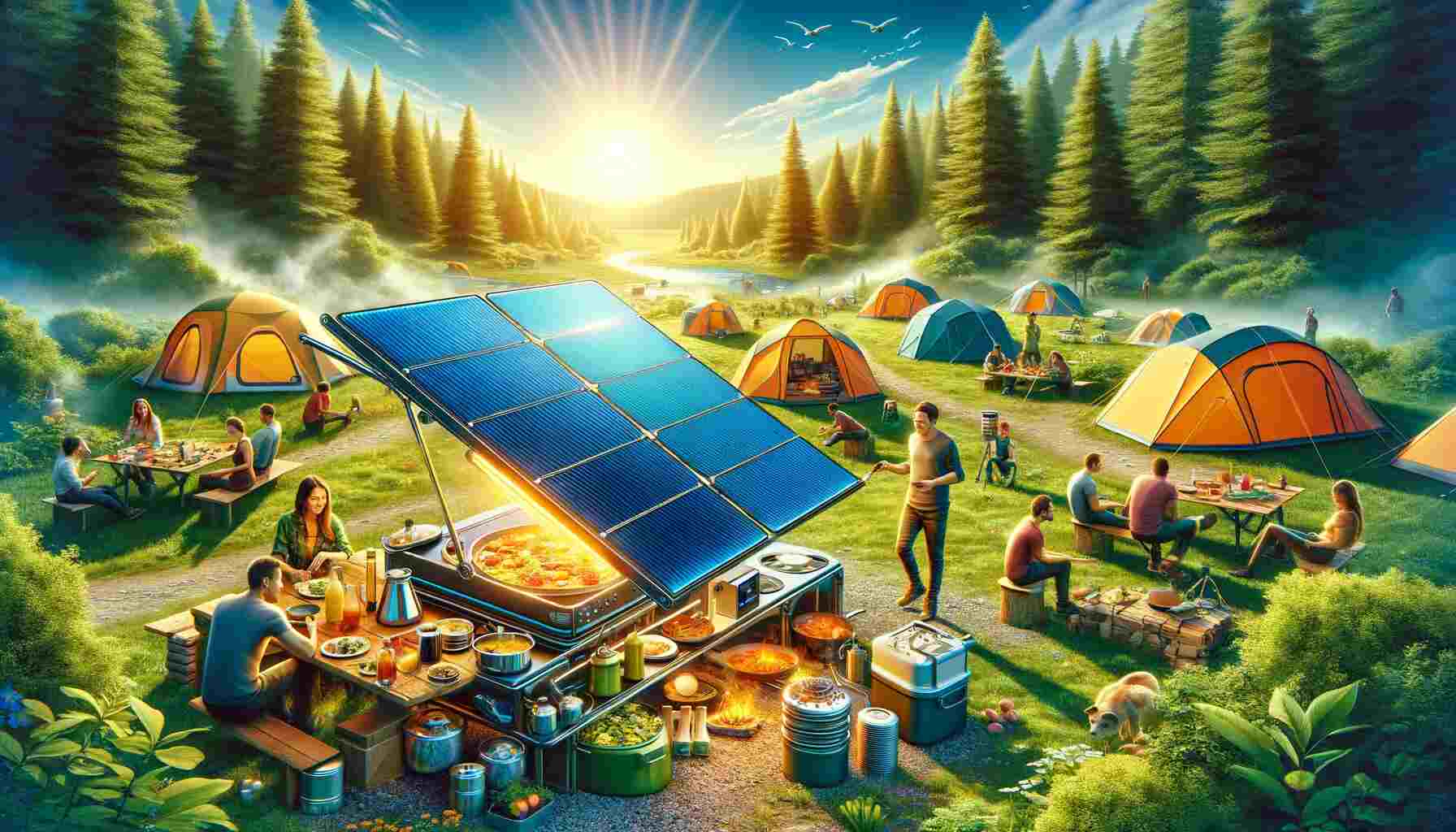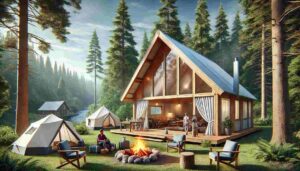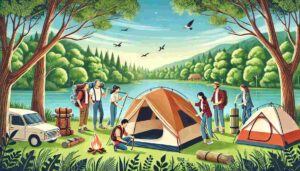Camping has come a long way from the days of open fires and canned beans. With an increasing emphasis on eco-friendly practices and a desire for culinary adventure in the great outdoors, solar cooking has emerged as a fascinating trend for campers in 2024.
This article will guide you through the art of mastering solar cooking while camping, exploring the history, types of solar cookers, DIY solutions, commercially available options, and practical tips. We’ll also compare solar cooking with traditional methods, discuss planning and preparation, and delve into broader eco-friendly camping practices.
Understanding Solar Cooking
History and Evolution
Solar cooking isn’t a new concept; it dates back centuries. The idea of using the sun’s energy to cook food has evolved over time, with various cultures adapting it to their needs. From ancient Greeks using reflective mirrors to harness the sun’s power to today’s high-tech solar ovens, the concept of solar cooking has grown in sophistication.
Types of Solar Cookers
- Parabolic Solar Cookers: These are designed with a parabolic mirror to concentrate sunlight onto a single focal point. They are highly efficient and cook quickly, making them ideal for campers on the go.
- Panel Solar Cookers: Panel cookers use reflective panels to direct sunlight onto a cooking pot. They are lightweight and easy to transport, making them suitable for backpackers.
- Solar Ovens: Solar ovens are box-like devices with reflectors that capture and focus sunlight into an insulated cooking chamber. They work well for slow cooking and baking.
Advantages of Solar Cooking
Solar cooking offers several advantages for campers:
- Safety: Solar cookers are safe to use, with no open flames or gas leaks to worry about.
- Environmental Benefits: Solar cooking reduces your carbon footprint by eliminating the need for fossil fuels.
- Energy Conservation: Solar cooking harnesses renewable energy, helping you save resources during your camping trip.
DIY Solar Cooking Solutions
Building a Basic Solar Oven
Creating a DIY solar oven is both fun and sustainable. Here’s a simple guide:
- Materials: Gather cardboard, aluminum foil, a transparent sheet (e.g., glass or plastic), and adhesive.
- Construction: Create a reflective surface by covering the cardboard with aluminum foil. Form a box shape and attach the transparent sheet as the lid.
- Cooking Setup: Place your cooking vessel inside the box, ensuring sunlight enters through the transparent lid.
Optimizing Homemade Solar Cookers
To get the best results from your DIY solar oven:
- Angle Adjustment: Position the oven towards the sun, adjusting the angle to maximize sunlight exposure.
- Insulation: Improve heat retention by adding extra layers of cardboard or insulation.
- Cooking Time: Be patient; solar cooking is slower than traditional methods but rewards you with flavorful results.
Simple Solar Recipes
Experiment with these easy solar recipes:
- Solar-Baked Potatoes: Wrap potatoes in foil with seasonings, and let the sun work its magic for a tasty side dish.
- Solar S’mores: Make the classic camping treat by placing marshmallows and chocolate between graham crackers and letting the sun melt them together.
Commercially Available Solar Cookers
Popular Models
In 2024, several solar cooker models have gained popularity among campers:
- Solavore Sport: Known for its durability and efficiency, this solar oven can reach temperatures of up to 300°F (149°C). It’s great for baking, roasting, and slow cooking.
- Go Sun Survival Gear Solar Cooker: This compact, portable cooker uses a vacuum tube to harness sunlight, allowing for fast cooking times. It’s perfect for campers on the move.
Comparison of Models
When choosing a commercially available solar cooker, consider factors like size, temperature range, and ease of use. Each model has its unique features and advantages, so pick the one that suits your camping style and cooking needs.
Solar Cooking Vs. Traditional Methods
Efficiency and Convenience
Solar cooking, while eco-friendly, may not always be as fast as traditional methods. Gas stoves and wood stoves are quicker, but they come with their own drawbacks:
- Gas Stoves: Dependence on gas can be problematic in remote camping locations where refills might not be readily available.
- Wood Stoves: Burning wood releases carbon emissions and requires carrying fuel.
Safety
Solar cooking is inherently safer than open fires or gas stoves. With no flames involved, the risk of accidents is significantly reduced. This safety factor makes it an attractive choice for family camping trips.
Real-life Testimonials
Many campers have switched to solar cooking and shared their experiences:
- Savings: Solar cooking reduces the need to carry fuel, saving money in the long run.
- Taste: Solar-cooked food often has a unique, delicious flavor.
- Sustainability: Campers appreciate the reduced environmental impact.
Planning and Preparation for Solar Cooking While Camping
Choosing the Right Solar Cooker
Selecting the right solar cooker depends on your camping needs. Consider factors such as group size, cooking style, and the duration of your trip. Smaller, portable models may be ideal for solo campers, while larger ovens suit group outings.
Essential Equipment and Ingredients
Ensure you have the following essentials for solar cooking:
- Cooking Vessel: Choose pots and pans suitable for your solar cooker.
- Thermometer: Monitor cooking temperatures to ensure food safety.
- Ingredients: Plan your meals and bring suitable ingredients, considering cooking times and temperatures.
Meal Planning and Food Safety
Plan your meals wisely to make the most of solar cooking:
- Preparation: Chop ingredients and marinate meat or vegetables in advance to save time.
- Food Safety: Maintain proper food safety measures, especially in sunny and warm conditions.
Practical Tips and Tricks
Aligning and Adjusting Solar Cookers
To maximize solar cooking efficiency:
- Sun Tracking: Adjust your solar cooker’s position to follow the sun’s path during the day.
- Time Management: Plan cooking times to coincide with the sun’s peak intensity.
Challenges and Solutions
Solar cooking can present challenges in different weather conditions:
- Cloudy Days: Cooking may take longer, so plan accordingly and have alternative cooking methods available.
- Wind: Use windbreaks to protect your solar cooker from gusts that can reduce heat retention.
Maintenance and Care
Proper maintenance ensures the longevity of your solar cooker:
- Cleaning: Keep reflectors clean and free of dust to maintain optimal reflectivity.
- Storage: Store your solar cooker in a dry place to prevent rust or damage.
Eco-Friendly Camping Beyond Cooking
Sustainable Camping Practices
Solar cooking is just one aspect of eco-friendly camping. Consider other sustainable practices:
- Leave No Trace: Follow the Leave No Trace principles to minimize your impact on nature.
- Reducing Waste: Use reusable camping gear and minimize single-use plastics.
Solar Cooking in the Bigger Picture
Solar cooking is part of a broader movement towards sustainable camping. It reduces reliance on fossil fuels, lowers carbon emissions, and aligns with the principles of responsible outdoor recreation.
Conclusion
Mastering solar cooking while camping in 2024 offers a rewarding blend of culinary adventure and eco-consciousness. With a deep understanding of solar cooking, DIY solutions, and commercially available options, campers can enjoy delicious meals while reducing their environmental impact. As you embark on your next camping journey, consider harnessing the power of the sun to enhance your outdoor experience and leave a lighter footprint on the planet.










